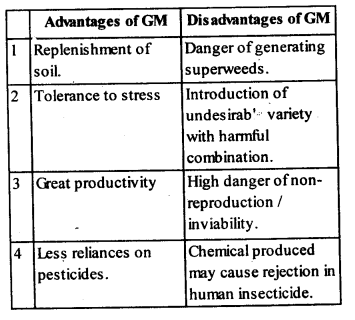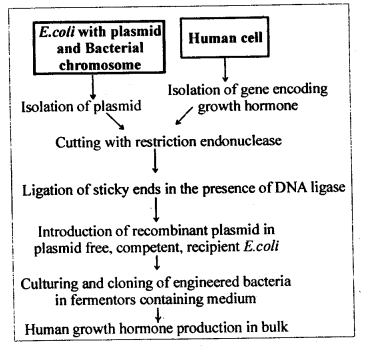Chapter 12 Biotechnology and its Applications
Class 12th Biology NCERT Book Solution
NCERT Solutions for Class 12 Biology Chapter 12 Biotechnology and its Applications:
QUESTIONS FROM TEXTBOOK SOLVED
1. Crystals of Bt toxin
produced by some bacteria do not kill the bacteria themselves because
–
(a)
bacteria are resistant to the toxin
(b) toxin is immature;
(c) toxin is inactive;
(d) bacteria encloses toxin in a special sac.
Ans: (c) Toxin is inactive.
2. What are transgenic
bacteria? Illustrate using any one example.
Ans: Bacteria having gene or
genes usually from an unrelated organism incorporated into their genome are
called transgenic bacteria. For example, when human insulin gene is introduced
into the isolated plasmid of E.coli bacterium and this recombinant DNA is
transferred into a fresh bacterium, then the later is said to be transgenic or
transformed bacterium.
3. Compare and contrast the
advantages and disadvantages of production of genetically modified
crops.
Ans:
4. What are Cry proteins?
Name an organism that produces it. How has man exploited this protein to his
benefit?
Ans:
The bacterium Bacillus thuringiensis is a common soil bacterium
which produces a protein toxin that kills certain insects. The toxin is a
crystal (Cry) protein. There are several kinds of Cry proteins which are toxic
to different groups of insects. The gene encoding Cry protein is called cry
gene. Biotechnologists have been able to isolate the gene responsible for
production of toxin and to introduce it into a number of plants to produce
genetically modified plants resistant to insects, e.g., Bt cotton (resistant to
bollworm) and GM tobacco (resistant to hornworms).
5. What is gene therapy?
Illustrate using the example of adenosine deaminase (ADA)
deficiency.
Ans:
Gene therapy is correction of malfunctioning/gen by repairing or
adding correct copy. ADA (adenosine deaminase deficiency) is a very rare genetic
disorder due to deletion of the gene for adenosine deaminase. The enzyme is
crucial for the immune system to functions. It can be treated by gene therapy.
This gene is transfected into early embryonic cells of bone marrow for permanent
use.
6. Digrammatically represent
the experimental steps in cloning and expressing an human gene (say the gene for
growth hormone) into a bacterium like E. coli?
Ans:
7. Can you suggest a method
to remove oil (hydrocarbon) from seeds based on your understanding of rDNA
technology and chemistry of oil?
Ans:
The genes for the formation of oil in the seed should be identified. The
appropriate genes should be removed with the help of restriction endonucleases.
Such DNA should then be treated with DNA ligases to make seal DNA at the broken
ends. These cells when grown aseptically on nutrient medium will differentiate
into a new plant whose seeds will not have oil in them.
8. Find out from internet
what is golden rice.
Ans: Golden rice is a
transgenic variety of rice (Oryza sativa) containing good quantities of
β-carotene (provitamin A) which is principle source of vitamin A. Since the
grains of the rice are yellow in colour due to β-carotene, the rice is commonly
called golden rice. It was developed at Swiss Federal Institute of Technology by
Professor Ingo Potrykus and Peter Beyer.
9. Does our blood have
proteases and nucleases?
Ans: No, blood does not
have protease and nuclease. If it would have been there blood and cell would
have been digested, some protease do exist in inactive form.
10. Consult internet and find
out how to make orally activ&protein pharmaceutical. What is the major
problem to be encountered?
Ans:
Orally active protein product that is successfully manufactured is vaccines for
preventions of infectious diseases such as hepatitis B, herpes, influenza, etc.
Gene for antigen are isolated from bacteria and grown along with cut leaf
portions of potato plant in antibiotic medium – followed by callus formation and
recombinant/transgenic potato are obtained which contain those vaccines.